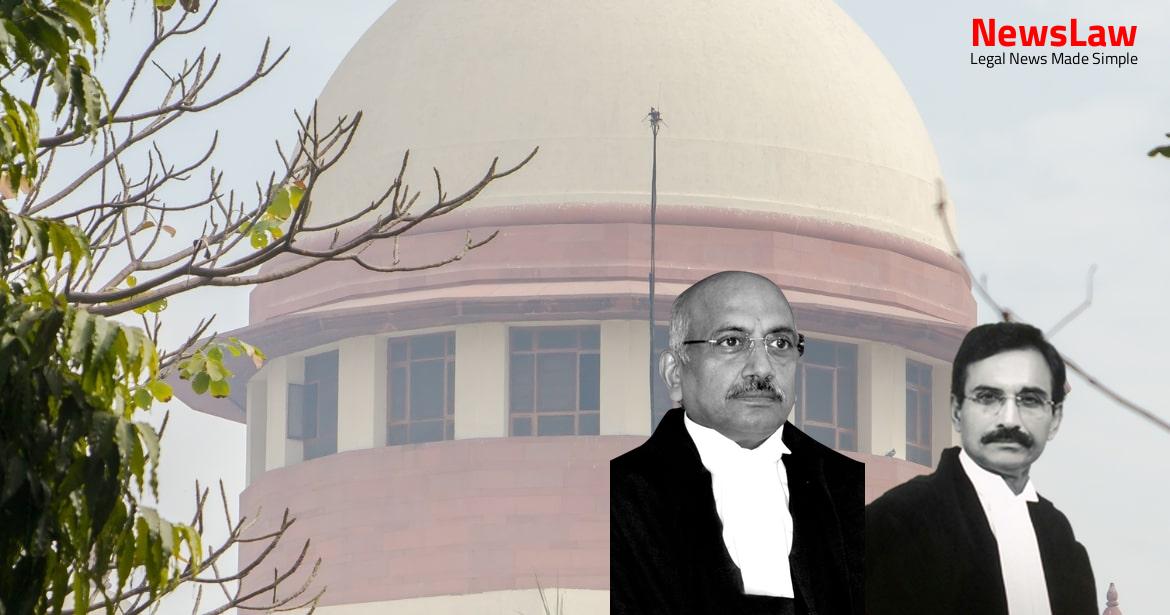In a legal case revolving around plot allotment, the court’s focus was on the repercussions of false affidavits submitted by the involved parties. The analysis by the court highlighted the importance of transparency and honesty in legal matters, emphasizing the severe consequences of misleading information in legal documents. This case sheds light on the legal implications of providing falsified information in affidavits and its impact on the outcome of the case.
Facts
- The plaintiff intentionally concealed the fact of allotment and filed a false affidavit for the Sector 30 plot.
- The plot at Sector 30 was cancelled on 18.10.1996 after the reply was considered.
- The plaintiff was aware of the allotment of the Sector 15A plot when the Sector 30 plot was allotted.
- The plaintiff and his wife were aware of the terms and conditions that they cannot retain both plots separately.
- The Sector 15A plot was sold to conceal the fact of obtaining double allotment.
- The plaintiff, his spouse, and dependent children denied owning any residential properties in Noida, Delhi, or New Delhi in an affidavit dated 1.12.1988.
- Notice was served to the plaintiff on 12.06.1996 regarding the false affidavit submitted for the Sector 30 plot since the Sector 15A plot was already allotted to his wife.
- The Sector 15A plot was initially allotted to the plaintiff’s wife on 10.03.1981.
- The wife of the plaintiff transferred the Sector 15A plot to Mrs. Kanta Modi after obtaining permission from the appellant, prior to the allotment of the Sector 30 plot.
- A transfer deed was executed on 25.10.1990.
- The plaintiff was allotted plot No D-49, Sector-30, Noida on 06.10.1981 and possession was handed over on 24.08.1991.
- The plaintiff filed a suit to restrain the defendant from re-allocating the Sector 30 plot and from dispossessing the plaintiff from the same.
- There was uncertainty due to litigation between the Society, of which the plaintiff was a member, and the appellant authority.
- The Sector 15A plot was allotted on 10.03.1981, and the plaintiff’s wife swore an affidavit on 04.03.1983 denying having been allotted any residential properties.
- No willful or dishonest intention by plaintiff and wife
- High Court affirmed Trial Court findings
- High Court held no dishonesty on part of plaintiff and wife
Also Read: Landmark Judgment on Compensation for Fatal Accident
Arguments
- The lease was not cancelled due to any violation of terms and conditions.
- All rights in the lease would survive.
- The plaintiff-respondent’s allotment was cancelled due to non-disclosure of his wife’s earlier plot allotment in violation of terms and conditions.
- The terms and conditions of the sale of developed leasehold rights were not produced on record by the plaintiff.
- The plot in Sector 15A was sought by the plaintiff, which had been originally allotted to his wife.
- No construction had been done on the plot due to disputes, and upon settlement, it was allotted to the Society, with the plaintiff being allotted a residential plot as a member.
- The trial court’s findings were affirmed by the First Appellate Court and not interfered with by the High Court as no substantial question of law arose.
- Legal precedents were cited to argue that determination of lease should be a last resort, and the authority has the power to unilaterally cancel the lease in case of non-payment or breach of conditions.
Also Read: Land Acquisition Compensation Analysis
Analysis
- The plaintiff and his wife both filed false affidavits regarding not owning any plots when in fact they did.
- The cancellation of the lease was not based on fraud in obtaining the lease but on violation of terms.
- The terms explicitly state that owning a plot in specific areas disqualifies one from allotment in Noida.
- The irregularity of the plaintiff owning a plot was rectified by permission from the Chief Executive Officer.
- Filing false affidavits disentitles the plaintiff from equitable relief.
- The lease could be cancelled if obtained by misrepresentation, misstatement, or fraud.
- Cancellation of an allotment obtained through false affidavit is justified.
- Fraud vitiates all actions, as per the ruling in S.P. Chengalvaraya Naidu v. Jagannath.
- Court was considering an affidavit attested by an Advocate in terms of Section 3(2) of the Oaths Act, 1969
- Judgments in Teri Oat Estates and Hari Om Enterprises also applied the Doctrine of Proportionality on different facts
- The second plot allotted to the plaintiff was done so against the express terms of allotment.
- This highlights the lack of equity and legal standing in favor of the plaintiff in this case.
Also Read: Judicial Review of Search and Seizure Authorization
Decision
- A person who misleads the Authority in obtaining allotment of a plot is not entitled to any relief.
- The judgment and decree of the courts below are set aside.
- The suit is dismissed.
- Consequently, the appeal is allowed.
Case Title: NEW OKHLA INDUSTRIAL DEVELOPMENT AUTHOURITY Vs. RAVINDRA KUMAR SINGHVI (DEAD) THR. LRS. (2022 INSC 184)
Case Number: C.A. No.-000382-000382 / 2012



